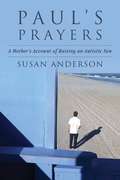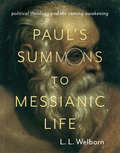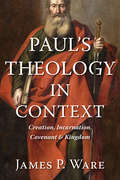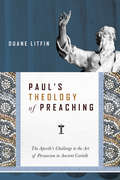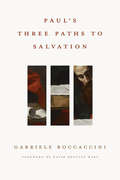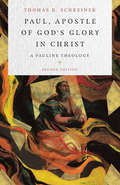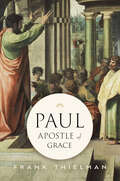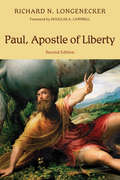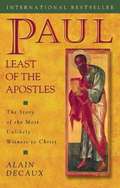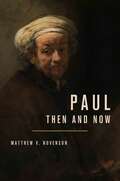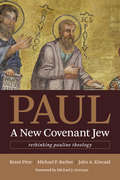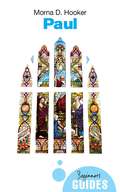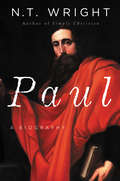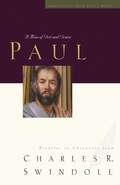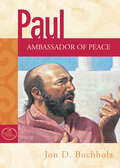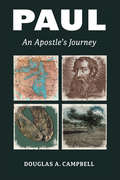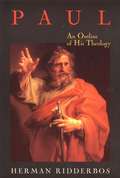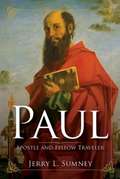- Table View
- List View
Paul's Political Strategy in 1 Corinthians 1–4 Constitution and Covenant (Society for New Testament Studies Monograph Series)
by Bradley J. BitnerThis volume examines 1 Corinthians 1–4 within first-century politics, demonstrating the significance of Corinth's constitution to the interpretation of Paul's letter. Bradley J. Bitner shows that Paul carefully considered the Roman colonial context of Corinth, which underlay numerous ecclesial conflicts. Roman politics, however, cannot account for the entire shape of Paul's response. Bridging the Hellenism-Judaism divide that has characterized much of Pauline scholarship, Bitner argues that Paul also appropriated Jewish-biblical notions of covenant. Epigraphical and papyrological evidence indicates that his chosen content and manner are best understood with reference to an ecclesial politeia informed by a distinctively Christ-centered political theology. This emerges as a “politics of thanksgiving” in 1 Corinthians 1:4–9 and as a “politics of construction” in 3:5–4:5, where Paul redirects gratitude and glory to God in Christ. This innovative account of Paul's political theology offers fresh insight into his pastoral strategy among nascent Gentile-Jewish assemblies. Is the first study to demonstrate the methodological viability and relevance of Corinth's constitution to the interpretation of 1 Corinthians. Analyses new documentary evidence Incorporates original methodological work and detailed exegesis.
Paul's Prayers: A Mother's Account of Raising an Autistic Son
by Susan AndersonRecipient of the Catholic Writers Guild 2018 Seal of Approval“A journey of compassion, frustration, and triumph . . . Anderson’s love for her son marks this beautiful portrait of family and faith.” —Publishers WeeklyPaul's Prayers is the story of a moderately autistic young man navigating life with a spiritual intelligence that runs further than most people can walk. Written by Paul's mother, this insightful memoir gives readers a unique look at the challenges and joys of raising her autistic son in a large Catholic family. The first of six children, Paul's early years were an exciting and confusing time for his parents. At the time, very little information on autism and its early signs was available, and the fact that the disorder is a spectrum ranging from mild to severe was not widely known. Unpredictable outbursts and sensitivities to light and schedule disruptions lead Paul's parents to refer to his condition as "The Marauder." The Marauder sweeps over the hospital nursery as the fluorescent lights blind Paul's eyes. The Marauder throws his black cape over the Christmas holidays, stealing four-year-old Paul's speech for three long days. In school, The Marauder keeps other students at bay, leaving Paul isolated and alone. Finally a developmental assessment gives some clarity to the exhausted family: Paul is on the autism spectrum, and they will all have to adjust their perspectives. Small victories emerge as Paul begins to reach developmental milestones in creative ways. Six years of piano lessons lead to a dramatic improvement in reading skills. A jaunt through the mountains with his father introduces Paul to his talent for running; with his brothers, he joins the high school cross country running team, which goes on to win the state championship. After high school, Paul works for the family business and attends college. Throughout this intimate memoir, every day is a challenge to be met with creative thinking, patience, and faith. Paul finds comfort in contemplative prayer and the support of his family when the world around him becomes too chaotic. As her son grows up, Susan Anderson learns how to cope with autism and embrace the importance of faith in the things unseen. Her family's experience is a beacon of light for those who find themselves on a similar path.
Paul's Summons to Messianic Life
by L. L. WelbornTaubes, Badiou, Agamben, Žižek, Reinhard, and Santner have found in the Apostle Paul's emphasis on neighbor-love a positive paradigm for politics. By thoroughly reexamining Pauline eschatology, L. L. Welborn suggests that neighbor-love depends upon an orientation toward the messianic event, which Paul describes as the "now time" and which he imagines as "awakening." Welborn compares the Pauline dialectic of awakening to attempts by Hellenistic philosophers to rouse their contemporaries from moral lethargy and to the Marxist idea of class consciousness, emphasizing the apostle's radical spirit and moral relevance.
Paul's Summons to Messianic Life: Political Theology and the Coming Awakening (Insurrections: Critical Studies in Religion, Politics, and Culture)
by L. WelbornTaubes, Badiou, Agamben, i ek, Reinhard, and Santner have found in the Apostle Paul's emphasis on neighbor-love a positive paradigm for politics. By thoroughly reexamining Pauline eschatology, L. L. Welborn suggests that neighbor-love depends upon an orientation toward the messianic event, which Paul describes as the "now time" and which he imagines as "awakening." Welborn compares the Pauline dialectic of awakening to attempts by Hellenistic philosophers to rouse their contemporaries from moral lethargy and to the Marxist idea of class consciousness, emphasizing the apostle's radical spirit and moral relevance.
Paul's Theology in Context: Creation, Incarnation, Covenant, and Kingdom
by James P. WareThis accessible text by James P. Ware provides both a concise guide to Paul’s theology and a general introduction to the key issues and debates in the contemporary study of Paul. Examining Paul’s message in the context of the ancient world, Ware identifies what would have struck Paul’s original audience as startling or unique. By comparing Paul’s teaching to the other religions and philosophies of that day, Ware presents a fresh perspective on Paul’s theology, revealing four pillars of his thought: creation, incarnation, covenant, and kingdom. After examining each of these dimensions of Paul’s gospel, Ware explores the historical role of Paul within Christian origins and the astounding evidence embedded in his letters regarding the beginnings of Christianity and the eyewitness origins of the gospels. Clergy, students, and laypeople will find that this guide to the big picture of Paul’s theology will illumine and enliven the study, preaching, and teaching of all the Pauline letters.
Paul's Theology of Preaching: The Apostle's Challenge to the Art of Persuasion in Ancient Corinth
by Duane Litfin"We preach Christ crucified: a stumbling block to Jews and foolishness to Gentiles, but to those whom God has called, both Jews and Greeks, Christ the power of God and the wisdom of God." When Paul preached about the crucified and risen Jesus Christ to the church at Corinth and elsewhere, did he follow the well-established rhetorical strategy of his day or did he pursue a different path? And what does that mean for the preaching of the church today? Through a detailed analysis of 1 Corinthians 1-4, Duane Litfin explores the rhetorical context of Paul?s preaching and his own understanding of his task as a preacher. What is revealed in this investigation is a sharp distinction between Greco-Roman rhetorical strategies, which sought to persuade, and Paul?s theology of preaching, which was based on the model of an obedient herald. This revised and expanded version of Litfin's previous St. Paul's Theology of Proclamation will provide insight to those engaged in Pauline and New Testament studies, rhetorical theory, and Greco-Roman studies. Moreover, by offering a better understanding of Paul's method as well as the content of his declaration concerning "the power and wisdom of God" revealed in Jesus, this book will help preachers as they undertake the ongoing task to "preach Christ crucified."
Paul's Three Paths to Salvation
by Gabriele Boccaccini&“We no longer need to separate Paul from Judaism in order to claim his Christianness,&” writes Gabriele Boccaccini, adding, &“nor do we need to separate him from the early Jesus movement in order to state his Jewishness.&” With this guiding principle Boccaccini unpacks the implications of Paul&’s &“belonging&” simultaneously to Judaism and Christianity to arrive at the surprising and provocative conclusion that there are in fact three means of salvation: For Jews, adherence to Torah.For gentiles, good works according to conscience and natural law.For all sinners, forgiveness through faith in Jesus Christ.Paul&’s Three Paths to Salvation is an attempt to reconcile the many facets of Paul&’s complex identity while reclaiming him from accusations of intolerance, and Boccaccini&’s work in reestablishing the figure of Paul as a messenger of God&’s Mercy to the sinners is an important contribution to the ongoing conversation about Paul&’s place in the contemporary pluralistic world.
Paul, Apostle of God's Glory in Christ: A Pauline Theology
by Thomas R. SchreinerThe theology of the apostle Paul is complex, set forth in numerous occasional letters, and subject to a seemingly endless variety of interpretations. How should students of Scripture engage the challenging task of discerning the shape of Paul's thought?Paul, Apostle of God's Glory in ChristPaul, Apostle of God's Glory in Christ
Paul, Apostle of Grace
by Frank ThielmanAn engaging and accessible introduction to the life and world of Paul In this fresh and engaging survey, Frank Thielman introduces readers to the life and world of the apostle Paul. Drawing on the Acts of the Apostles and Paul&’s canonical letters as well as noncanonical sources and archaeological records, Thielman constructs a vivid picture of the complex historical period and fascinating cultures in which Paul worked. At the same time, Thielman guides readers toward a deeper understanding of who Paul was, what he believed, and how he carried out his ministry. Solidly grounded in Paul&’s own writings as well as scholarly research, the book explores a wide range of compelling questions: What drove Paul to endure often treacherous journeys of hundreds of miles to establish like-minded communities around the world as he knew it? What spurred him to recruit a network of co-workers who were willing to help him in this vast project? What kept him at the task even when it landed him in prison? What prompted him to produce a body of letters to these communities of such depth that millions of people still read them with profit today? Addressing these questions through careful and conservative research, Paul, Apostle of Grace is a worthy successor to F. F. Bruce&’s classic study and an essential resource for scholars and students of the Bible today.
Paul, Apostle of Liberty: The Origin And Nature Of Paul's Christianity
by Richard N. LongeneckerPaul’s teachings are vital to the Christian gospel, so the turbulent, long-running debate over how to interpret Paul’s message is crucially important. Richard Longenecker’s Paul, Apostle of Liberty has long stood — and still stands — as a significant, constructive, evangelical study of Paul’s theology, especially of the creative tension between law and liberty that runs throughout his thought. When this book was originally published in 1964, Longenecker then presciently anticipated several subsequent debates, addressing many of the same questions that such scholars as E. P. Sanders and Richard Hays did years later. This second edition of Paul, Apostle of Liberty includes a substantial foreword by Douglas Campbell and a lengthy addendum by Longenecker discussing the major developments in Paul studies over the past fifty years.
Paul, Apostle of Liberty: The Origin And Nature Of Paul's Christianity
by Richard N. LongeneckerPaul&’s teachings are vital to the Christian gospel, so the turbulent, long-running debate over how to interpret Paul&’s message is crucially important. Richard Longenecker&’s Paul, Apostle of Liberty has long stood — and still stands — as a significant, constructive, evangelical study of Paul&’s theology, especially of the creative tension between law and liberty that runs throughout his thought. When this book was originally published in 1964, Longenecker then presciently anticipated several subsequent debates, addressing many of the same questions that such scholars as E. P. Sanders and Richard Hays did years later. This second edition of Paul, Apostle of Liberty includes a substantial foreword by Douglas Campbell and a lengthy addendum by Longenecker discussing the major developments in Paul studies over the past fifty years.
Paul, Least of the Apostles: The Story of the Most Unlikely Witness to Christ
by Alain DecauxIn this compelling biography, Alain Decaux presents Paul as a man of exceptional passion and conviction, courage and faith, yet one branded by human contradictions, self-doubt, and personal weakness. Evoking memories of visits he has made to places where the Apostle lived and traveled, Decaux fuses the past with the present to offer and imaginative yet authentic vision of St. Pauls extraordinary story. Beautiful artwork images of the Apostle enrich the text, along with photos relating to Pauls travels.
Paul, Then and Now
by Matthew V. NovensonReckoning with the hermeneutical struggle to make sense of Paul as both a historical figure and a canonical muse. Matthew Novenson has become a leading advocate for the continuing relevance of historical-critical readings of Paul even as some New Testament scholars have turned to purely theological or political approaches. In this collection of a decade&’s worth of essays, Novenson puts contextual understandings of Paul&’s letters into conversation with their Christian reception history. After a new, programmatic introductory essay that frames the other eleven essays, Novenson explores topics including:the relation between theology and historical criticismthe place of Jews and gentiles in Paul&’s gospelPaul&’s relation to Judaismthe relevance of messianism to Paul&’s ChristologyPaul&’s eschatology in relation to ancient Jewish eschatologiesthe aptness of monotheism as a category for understanding antiquitythe reception of Paul by diverse early Christian writersthe peculiar place of Protestantism in the modern study of Paulthe debate over the recent Paul-within-Judaism movementanti-Judaism in modern New Testament scholarshipdisputes over Romans and Galatiansthe meta-question of what it would mean to get Paul right or wrong Engaging with numerous schools of thought in Pauline studies—Augustinian, Lutheran, New Perspective, apocalyptic, Paul-within-Judaism, religious studies, and more—while also rising above partisan disputes between schools, Novenson illuminates the ancient Mediterranean context of Paul&’s letters, their complicated afterlives in the history of interpretation, and the hermeneutical struggle to make sense of it all.
Paul, a New Covenant Jew: Rethinking Pauline Theology
by Brant Pitre Michael P. Barber John A. KincaidAfter the landmark work of E. P. Sanders, the task of rightly accounting for Paul's relationship to Judaism has dominated the last forty years of Pauline scholarship. Pitre, Barber, and Kincaid argue that Paul is best viewed as a new covenant Jew, a designation that allows the apostle to be fully Jewish, yet in a manner centered on the person and work of Jesus the Messiah. This new covenant Judaism provides the key that unlocks the door to many of the difficult aspects of Pauline theology.Paul, a New Covenant Jew is a rigorous, yet accessible overview of Pauline theology intended for ecumenical audiences. In particular, it aims to be the most useful and up to date text on Paul for Catholic Seminarians. The book engages the best recent scholarship on Paul from both Protestant and Catholic interpreters and serves as a launching point for ongoing Protestant-Catholic dialogue.
Paul, a New Covenant Jew: Rethinking Pauline Theology
by Brant Pitre Michael P. Barber John A. KincaidAfter the landmark work of E. P. Sanders, the task of rightly accounting for Paul's relationship to Judaism has dominated the last forty years of Pauline scholarship. Pitre, Barber, and Kincaid argue that Paul is best viewed as a new covenant Jew, a designation that allows the apostle to be fully Jewish, yet in a manner centered on the person and work of Jesus the Messiah. This new covenant Judaism provides the key that unlocks the door to many of the difficult aspects of Pauline theology.Paul, a New Covenant Jew is a rigorous, yet accessible overview of Pauline theology intended for ecumenical audiences. In particular, it aims to be the most useful and up to date text on Paul for Catholic Seminarians. The book engages the best recent scholarship on Paul from both Protestant and Catholic interpreters and serves as a launching point for ongoing Protestant-Catholic dialogue.
Paul, the Stoics, and the Body of Christ
by Michelle V. LeeAt first glance, Paul's words to the Corinthians about being the body of Christ seem simple and straightforward. He compares them with a human body so that they may be encouraged to work together, each member contributing to the good of the whole according to his or her special gift. However, the passage raises several critical questions which point to its deeper implications. Does Paul mean that the community is 'like' a body or is he saying that they are in some sense a real body? What is the significance of being specifically the body of Christ? Is the primary purpose of the passage to instruct on the correct use of spiritual gifts or is Paul making a statement about the identity of the Christian community? Michelle Lee examines Paul's instructions in 1 Corinthians 12-14 against the backdrop of Hellenistic moral philosophy, and especially Stoicism.
Paul: A Beginner's Guide (Beginner's Guides)
by Morna D. HookerThe Apostle Paul has shaped the course of Christian ethics for centuries and is widely regarded as the most influential theologian in the Christian tradition. In this authoritative introduction, Morna D. Hooker offers a female perspective on a figure often portrayed as a conservative misogynist. Original and thought-provoking, this concise study is essential reading for all who seek to learn more about one of the most controversial figures in Christianity. Morna D. Hooker is Lady Margaret's Professor of Divinity Emerita at Cambridge University. She is fellow of Robinson College, Cambridge, and the author of thirteen books and numerous papers.
Paul: A Biography (The\new Testament For Everyone Ser.)
by N. T. WrightIn this definitive biography, renowned Bible scholar, Anglican bishop, and bestselling author N. T. Wright offers a radical look at the apostle Paul, illuminating the humanity and remarkable achievements of this intellectual who invented Christian theology—transforming a faith and changing the world.For centuries, Paul, the apostle who "saw the light on the Road to Damascus" and made a miraculous conversion from zealous Pharisee persecutor to devoted follower of Christ, has been one of the church’s most widely cited saints. While his influence on Christianity has been profound, N. T. Wright argues that Bible scholars and pastors have focused so much attention on Paul’s letters and theology that they have too often overlooked the essence of the man’s life and the extreme unlikelihood of what he achieved.To Wright, "The problem is that Paul is central to any understanding of earliest Christianity, yet Paul was a Jew; for many generations Christians of all kinds have struggled to put this together." Wright contends that our knowledge of Paul and appreciation for his legacy cannot be complete without an understanding of his Jewish heritage. Giving us a thoughtful, in-depth exploration of the human and intellectual drama that shaped Paul, Wright provides greater clarity of the apostle’s writings, thoughts, and ideas and helps us see them in a fresh, innovative way.Paul is a compelling modern biography that reveals the apostle’s greater role in Christian history—as an inventor of new paradigms for how we understand Jesus and what he accomplished—and celebrates his stature as one of the most effective and influential intellectuals in human history.
Paul: A Man of Grace and Grit (Great Lives Series #6)
by Charles SwindollThe apostle Paul. The converted terrorist, inspired author, amazing teacher, and patient mentor.This colossal figure strode boldly onto the stage of the first-century world and left an indelible signature of greatness never to be forgotten. His life? Magnificent! And his ministry? Impressive. While assigned sainthood by some today, by his own description he was "the chief of all sinners." No other person in the Bible, aside from Christ Himself, had a more profound influence on his world and ours than Paul.He was a man of real grit, with a firmness of mind and spirit and unyielding courage in the face of personal hardship and danger. Tough, tenacious, and fiercely relentless, Paul pursued his divine mission with unflinching resolve. And God used him mightily to turn the world upside down for Christ in his generation.But Paul's message and his style were also marked by gentle grace. This man, who tormented and killed the saints of God, understood and explained grace better than any of his contemporaries. Why? Because he never got over his own gratitude as a recipient of it. God's super-abounding grace transformed this once-violent aggressor into a humble-but-powerful spokesman for Christ. A man with that much grit desperately needed that much grace.Perhaps that's why Paul's life is such a source of hope for us. If the chief of sinners can be forgiven and become God's chosen vessel, can He not forgive and use us as well? He can, if we too become people of both grace and grit. Paul is the sixth of a multi-volume series exploring Great Lives from God's Word and searching them to find the qualities that made them great. Join us for an exciting, in-depth look at this amazing life, as only Chuck Swindoll can describe it: Paul: A Man of Grace and Grit.
Paul: A Man of Grit and Grace (Great Lives from God's Word, Volume #6)
by Charles R. SwindollA book about the Apostle Paul
Paul: A Very Short Introduction
by E. P. SandersMissionary, theologian, and religious genius, Paul is one of the most powerful human personalities in the history of the Church. E.P. Sanders, an influential Pauline scholar, analyzes the fundamental beliefs and vigorous contradictions in Paul's thought, discovering a philosophy that is less of a monolithic system than the apostle's convictions would seem to suggest. This volume offers an incisive summation of Paul's career, as well as his role in the development of early Christianity. Both lucid and judicious, it is the most compelling short introduction to Paul now available.
Paul: Ambassador of Peace (God's People)
by Jon D BuchholzWho was Paul in the Bible?See how a powerful and loving Savior transformed his most vigorous adversary into his greatest missionary.Paul’s travels were full of danger, heartache, disappointment, and physical abuse, but they were also full of exhilarating joy over the gospel’s power to change hearts.If you’re wondering who Paul was, or want to know how Paul’s faith journey impacts your own, this book is for you!Paul is part of the God’s People series by Northwestern Publishing House. It’s a wonderful collection about the lives and times of some of God’s chosen people. Plots and settings have been taken directly from the Bible, and each book features beautifully detailed, full-color illustrations.
Paul: An Apostle's Journey
by Douglas A. CampbellDouglas Campbell has made a name for himself as one of Paul’s most insightful and provocative interpreters. In this short and spirited book Campbell introduces readers to the apostle he has studied in depth over his scholarly career.Enter with Campbell into Paul’s world, relive the story of Paul’s action-packed ministry, and follow the development of Paul’s thought throughout both his physical and his spiritual travels.Ideal for students, individual readers, and study groups, Paul: An Apostle’s Journey dramatically recounts the life of one of early Christianity’s most fascinating figures—and offers powerful insight into his mind and his influential message.
Paul: An Outline of His Theology
by Herman RidderbosNow back in print in a beautiful new paperback edition, this study by one of Europe's foremost New Testament scholars provides a comprehensive exposition of the teaching of the apostle Paul. Firmly grounded in a careful exegesis of the biblical text and crafted with constant reference to the wealth of scholarly study of Paul's writings, this volume is a standard for interpreters of Paul's thought and all students of the New Testament.
Paul: Apostle and Fellow Traveler (Symposium Ser. #Vol. 16)
by Jerry L. SumneyCovering the entire Pauline corpus the reader finds a man who was adept at persuasive arguments and providing theological answers to real and, often, thorny congregational issues. Readers have a keen understanding of Paul’s place in the early church, the relationship between church and synagogue, and the relationship between the teaching of Paul and that of Jesus. These discussions set Paul firmly within the church that existed before he joined, finding that he became an adherent to much that preceded him.

